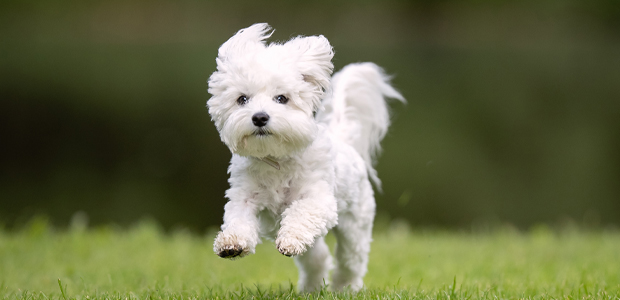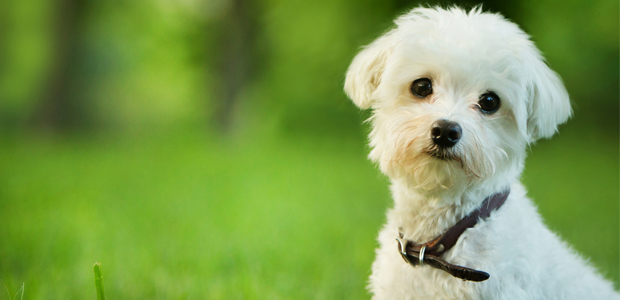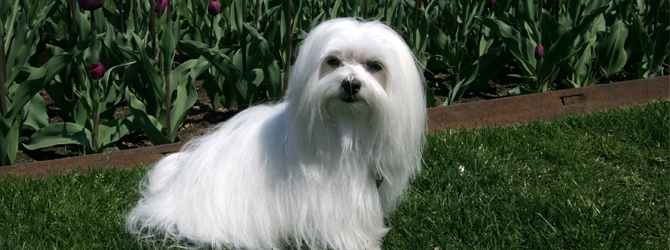The Maltese: is it the right breed for you?
First Published: 01/06/2021
Last Updated: 28/12/2023
A sweet and intelligent dog, the Maltese is instantly recognisable thanks to its glamorous silky coat. Small in stature, they are brave dogs that greet everyone with a friendly approach.
Believed to have originated thousands of years ago in the Mediterranean, the dogs have always carried a high status, favoured by philosophers and royalty.
Maltese Summary:
- Ancient breed favoured by royalty
- White, silky, floor length coat
- Maltese life expectancy = 12 - 15 years
- Average size = 20 - 25cm
- Average weight = 1 - 3 kg
- Estimated monthly cost = Medium
- Exercise needs = Low
- Attention needs = High
- Sociability = Medium
Please note: A dog’s exercise, training/stimulation and grooming requirements can depend on several factors such as age and health. The same goes for ongoing costs of ownership. For advice on one specific dog, we always advise chatting with a vet.
How much exercise does a Maltese need?
Even though they are a toy breed, Maltese are lively dogs that love to play. To give them a chance to burn off all their energy and maintain a healthy lifestyle, you should walk your Maltese for around 30 minutes per day.
To keep them happy and healthy, take them to a secure environment where they can run off-lead, with lots of interesting things to see and sniff.
Maltese dietary requirements
Your Maltese will need a balanced diet that is rich in nutrients, vitamins and minerals. It’s best to feed them complete dog food specially formulated for small breeds to ensure that they are getting the right amount of vitamins and nutrients.
Growing pups may prefer 3-4 smaller servings during the day, rather than two larger meals. This can be reduced to two meals a day as your dog gets older.
The recommended portion size will depend on your individual dog. You’ll need to take into account their activity level, age and metabolism. To avoid weight gain, make sure your Maltese has a healthy and balanced diet and gets plenty of exercise.
For dietary advice that’s specific to your dog, have a chat with your local vet or the breeder you’re purchasing your puppy from.

Training: how to train a Maltese
Obedient and intelligent little dogs, the Maltese responds well to training and learning new things. It can be the case that toilet training can take longer than with other breeds, although with patience and perseverance, they will pick it up.
Maltese are a social breed and enjoy human interaction and playing with other dogs. They will benefit from socialising from an early age and attending puppy socialization classes.
As is the case with all breeds, the Maltese will start to approach new experiences with caution when they are around 12 weeks old. Therefore, it’s really important for their development that they experience as many different situations as possible.
Whilst they are still so young and receptive, it's a good idea to introduce your Maltese to other dogs, people and livestock as well as car travel and unfamiliar noises, such as traffic.
Affectionate dogs who love cuddling and human interaction, Maltese can be prone to developing separation anxiety. It’s good practice to leave them on their own for small periods during training so that they can get used to being by themselves.
Grooming: do Maltese dogs shed?
The Maltese is famed for its silky white coat that reaches all the way to the floor. Often, owners decide to have their coats clipped to make them easier to manage.
You might expect them to be serial shedders, but the Maltese has a different undercoat to most dogs, meaning that they shed less than average.
Their coats are quite high maintenance and can easily become dirty and matted if they aren’t tended to regularly. Because of their long bright white coat, they can develop some urine staining, this can be managed with regular washes using dog shampoo.
Tear staining is also a common issue for Maltese Owners. To manage face stains, regularly clean their eyes with warm water and wash the hairs on their face after they eat.
A daily brush will prevent knots and tangles and is a great way to make sure their skin and coat stays in tip-top condition, as well as providing an opportunity to bond with your dog. Alongside daily brushing, the Maltese will benefit from professional grooming every month or so. Complete your grooming routine with regular tooth brushing, nail clips and ear checks.
Cost of owning a Maltese
When considering the lifetime cost of owning a Maltese, remember to take into account the following costs:
- Maltese nutritional needs
- Veterinary care
- Pet insurance
- Kennels or dog sitters
- Maltese grooming costs
- Toys and equipment
Are Maltese dogs prone to any health problems?
The Maltese is prone to certain health problems, just like all breeds. This doesn’t mean your dog is guaranteed to contract any particular disease – it’s just something to bear in mind.
To keep your Maltese as healthy as possible, monitor them closely and attend routine 6-month health checks with your vet. This will allow the vet to give your dog a thorough check-up and to pick up on minor (often symptomless) conditions before they have a chance to escalate into something worse.
Possible health complications for Maltese include:
- Canine dental issues and gum disease
- Infections
- Obesity and weight problems in dogs
- Allergies in dogs (including flea, food and pollen)
- Eye problems

Maltese temperament, socialising and ideal home environment
The Maltese is a caring, affectionate dog that loves people. They are tiny, delicate dogs so it isn’t recommended that they spend lots of time around young children and boisterous dogs.
Due to their small size, it's easy for them to become injured if they are dropped, stepped on, or played with too roughly. They will thrive in a home with older children who know how to gently handle dogs. They are social animals and will generally get on well with other pets, provided they are introduced at a young age.
Because they are a toy breed, the Maltese won’t need vast amounts of space in which to roam, so they are perfectly happy in smaller homes and apartments providing their exercise needs are met.
Are Maltese dogs suitable for first time owners?
A Maltese is a good choice for first time owners because of their friendliness and sociability. A true lap dog, the love to show affection and are quick learners when it comes to training.
They are gentle dogs that are suited to most sizes of living environments. The Maltese has fairly low exercise needs, so they aren’t as big of a commitment when it comes to exercise. You won’t have to spend hours walking them, so they should fit in with most modern lifestyles.
Need more info?
For more info on finding the best dog breed for you and your lifestyle, have a chat with your vet. Find your nearest vet using our Find a Vet page, or speak to a vet online using Online Vets.
